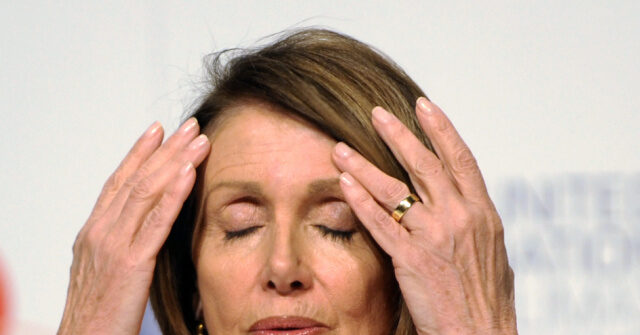During a recent book tour event in New York City, Rep. Nancy Pelosi faced a significant disruption from pro-Palestinian protesters vehemently expressing their dissent towards her political stance, especially regarding Israel. The incident unfolded as protesters shouted over her, creating a cacophony that overshadowed her remarks, signaling a growing discontent among the more radical elements within the Democratic Party. Their interruptions lasted for over a minute, primarily targeting Pelosi for her perceived alignment with Israel amidst the ongoing conflict in Gaza, illustrating how deeply polarized the political climate has become regarding Israel-Palestine relations.
In response to the uproar, Pelosi attempted to maintain her composure, alluding to her experiences dealing with hecklers in San Francisco, her home base, indicating that she was not entirely taken aback by the protest. She remarked, “Don’t worry about that. I’m from San Francisco. I’m used to this,” signaling both her awareness of the contentious political landscape and perhaps her frustration with the radical branch of her own party. This moment not only highlighted her current position but also reflected how internal divisions within the Democratic Party could potentially impact her public reception and political standing.
As the protest continued, various voices from the crowd expressed dissatisfaction with Pelosi’s policies concerning Israel, with one protester poignantly stating, “There’s children dying in Gaza.” This statement encapsulated the urgency and emotional weight of the protesters’ grievances, underlining the human cost associated with the ongoing conflict and emphasizing the public’s demand for accountability from political leaders like Pelosi. The inability for her to effectively respond amidst the shouting not only distracted from the event’s intended purpose but also underscored the rising tensions surrounding the Israel-Palestine discourse within the U.S.
Katie Couric, the event’s host and a well-known journalist, intervened as the protests escalated, signaling her discomfort with the situation. She suggested pausing the event to manage the crowd disruption, emphasizing the challenge of maintaining decorum in a politically charged atmosphere. Her intervention reflects the balancing act public figures often must perform when addressing polarizing issues, as they strive to facilitate dialogue while also recognizing the passions that these topics evoke among audiences.
Once the protesters were eventually removed, the audience responded with applause, marking the resolution of the disruptive episode. This reaction not only indicated support for restoring order but also hinted at a broader sentiment about the event’s context and the need for civil discourse in political discussions. The interruption may have served to elevate the issue for some attendees, who might have been prompted to reflect more deeply on the serious allegations and claims being made by the protestors regarding U.S. foreign policy.
As political dynamics continue to evolve, events like this underscore the increasingly visible rifts within parties and the impactful role of grassroots movements in shaping political conversations. Wendy Husebo, a political reporter and analyst, pointed out that such incidents are indicative of the shifting paradigms within Democratic politics and the growing culpability politicians have to diverse constituencies that demand more from their representatives. As discussions surrounding Israel and Palestine persist, the implications of protests like these are likely to resonate well beyond the confines of a single event, influencing future political engagements and policies.

